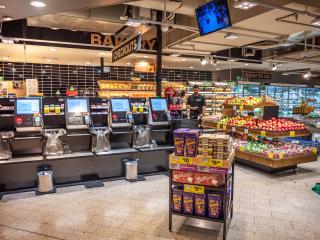Optimizing Queue Management - Don’t Let Self-Checkout Glitches Become an Achilles Heel

In spite of the progress society has made eliminating inconveniences, waiting in line remains “a timeless form of torture.” According to one new survey, Americans spend roughly 37 billion hours each year waiting in line, with retail stores highlighted as the worst offender. In fact, estimates show that Americans spend more time waiting in line at retail stores than at restaurants, pharmacies, doctor offices and banks combined.
Self-checkout systems offer a viable solution. They can dramatically cut down wait times; reduce labor costs (as one staff member can overlook several self-checkout kiosks) and improve customers’ perceptions of transaction speed, control and ease of use - all important factors leading to greater customer satisfaction. The right self-checkout systems can truly differentiate a retailer from competitors, optimize checkout and attract more customers.
But there’s a catch. Self-checkout systems experience performance (speed, reliability) glitches - and quite often actually. In fact, 67 percent of consumers that regularly use self-checkout have had at least one fail while using it. If a retailer cannot ensure near-perfect performance for self-checkout, slow and unreliable systems will inevitably alienate customers - endangering ROI from these investments.
What makes the performance of self-checkout systems so hard to monitor and maintain is, ironically, the enormous amount of log data these systems generate. Log data is a record of all events occurring in a system or application. It provides detailed information on internal health and a critical forewarning when something is going awry or a bottleneck is growing. Collected across hundreds or even thousands of individual store locations, today’s log volumes are growing so large that they’re actually becoming impossible for retailers to properly harness and leverage. It’s simply too cost-prohibitive to analyze all of this data.
When a self-checkout system experiences a performance glitch, the first step is often a call from an individual retail location to the retailer’s IT team. From there, that team goes to work manually digging through troves of data collected across their locations in a central repository, to identify the source of the problem. It’s a rigorous, complicated, and lengthy process. In the meantime, checkout lines at the store are getting longer and customers’ fuses are growing shorter.
Unfortunately, the pace of data growth isn’t going to slow down any time soon, especially as more customers grow accustomed to self-checkout. These systems have now become the dominant checkout format in grocery retail settings, with the share of transactions rising to 55 percent in 2022.
Clearly, a new approach is sorely needed. Rather than amassing data from all stores in a central repository, log data should be automatically analyzed as it’s being created, at its point of origin in each individual retail location. In doing so, individual retail stores can automatically detect any potential issues or growing hotspots as they are occurring. If there is a warning or error, the self-checkout system itself can alert the IT department automatically, with no human intervention required. IT teams can then access and find the data they need in order to fix the issue early, in most cases before system performance begins to degrade.
It is often said that technology is ruining our patience by rewiring our brains to expect instant gratification. In 2023, one would expect the self-checkout experience to be flawless, but ironically, a by-product of self-checkout technology - the sheer volume of log data - is getting in the way. The benefits of self-checkout can be so vast that we must not give customers any reason not to use them, including poor performance. But the only way to get a handle on ballooning log data volumes is to break them into smaller, bite-sized chunks that can be accessed and analyzed on an individual, store-by-store level. Check!
Ozan Unlu is the CEO of Edge Delta.
